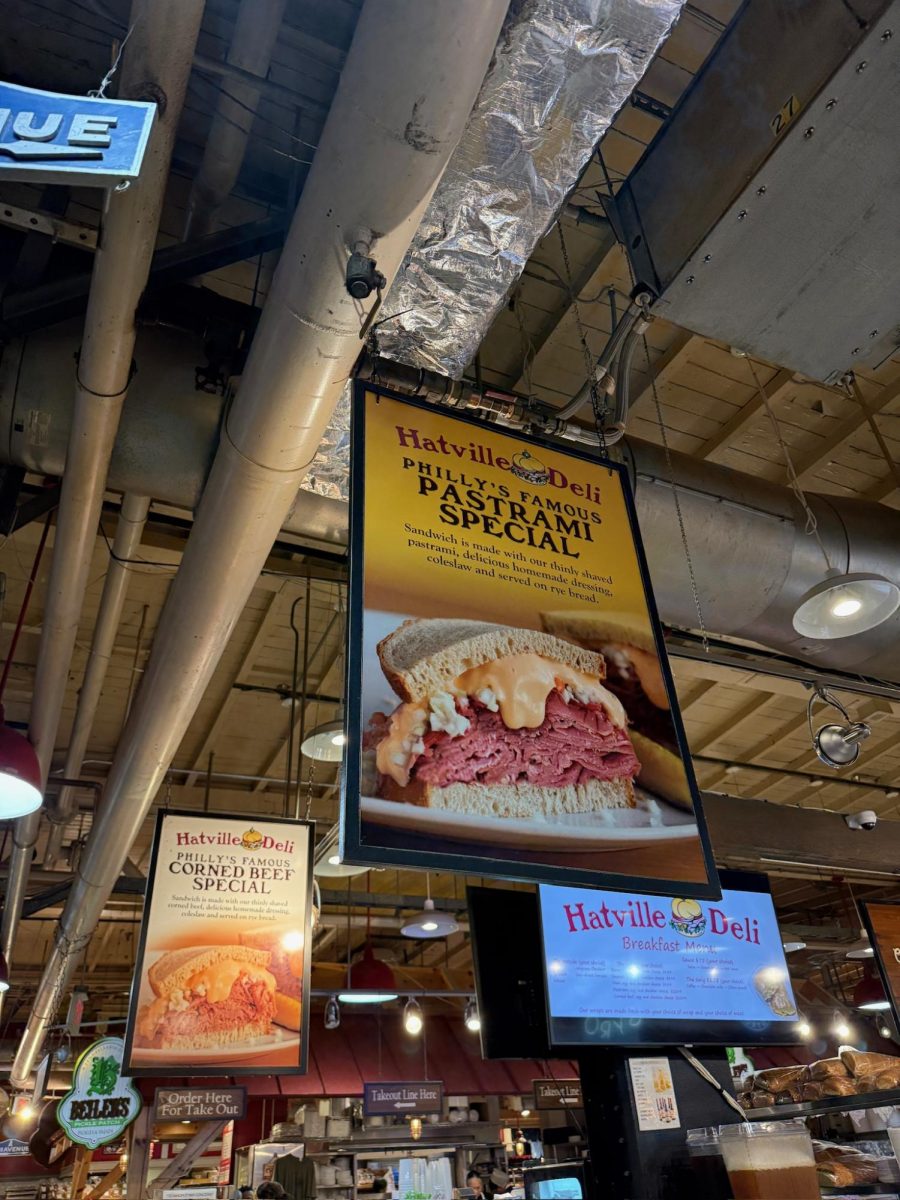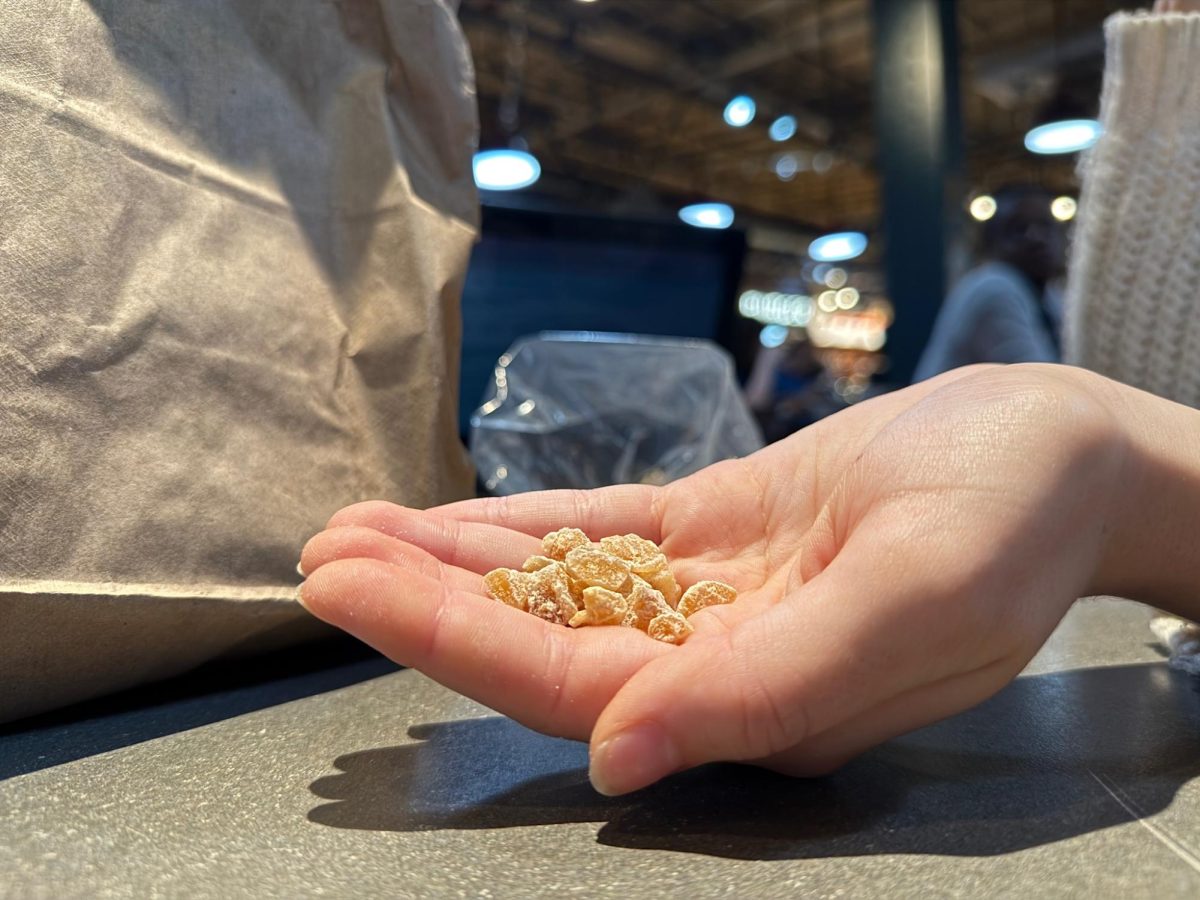A peek into the melting pot: Exploring Philadelphia’s Reading Terminal Market
Some of the fondest memories are exchanged at the dinner table. Food transcends borders, moving from farm to table, from table to mouth and from mouth to stomach. At its core, food is an exchange, which is the very quality that makes it a powerful vehicle for diplomacy.
Diplomacy is often thought of as a vague handshake — something beyond the scope of the average citizen. But in fact, the arms of diplomacy extend into every crevice of the more than 80 merchants at Reading Terminal Market. To gain more insight on the influence of this “culinary diplomacy” — the promotion of certain dishes to bolster national identity — we first set out for answers from Bassetts Ice Cream, whose international sales account for a significant portion of their annual revenue.
“The matcha flavor connects with our markets in Asia,” said a Bassetts employee of the ice cream’s cross-cultural impact. “People actually come from China and Japan to try it. We have people that travel back with quarts and pints.”
The employee also noted that customers from across the United States come to sample some of Bassetts’ signature flavors.
“Our ice cream is like a cultural phenomenon,” said the employee.
Even within Reading Terminal Market, Bassetts forges connections with other companies — connections that are built and bolstered by their ice cream.
“We have a partnership with about six different merchants,” said the employee. “4th Street Bakery uses our ice cream to put in their ice cream sandwiches.”
Across the vend, Little Thai Market harbors similar experiences with culinary diplomacy. Notably, the Thai government has been strategically rolling out initiatives since 2002 — like “Global Thai,” which awards special recognition to restaurants outside of Thailand for quality food — to place its dishes on the radar of the eclectic American palate.
“We like to share with the people how the Thai food tastes and looks,” said the owner of Little Thai. “We make good for that reason.”
Of the dishes that have attained particular acclaim in the U.S. over the past two decades, pad thai is one of the most popular, earning its spot as the de facto national dish of Thailand. While the Little Thai owner conceded that pad thai is definitely in vogue, her personal favorite menu offering is the salmon. And ostensibly, she’s not alone in that opinion.
The owner said, “People line up all around to get fresh salmon every day, especially during the summer time.”
While Little Thai makes it a point to share cultural cuisine with others, the owner makes sure to actively participate in the exchange of fares among different vendors with Reading Terminal Market.
“We love the cheesesteak here, which is popular in Philly,” the owner said.
Whether through handcrafted ice cream or pan-seared pad thai, cultural transactions take place everywhere you look at Reading Terminal Market. This market is a living, breathing testament to the fact that food can promote a convergence of culture.
“We provide the food,” said the owner of Little Thai, “and [the customers] take home with them a piece of Thailand.”
On the bustling sidewalks of Arch Street, Reading Terminal Market is the perfect place for Philadelphians to grab a quick bite to eat. Among an overwhelming choice of cuisines and vendors, Hatville Deli can easily provide the perfect corned beef sandwich for any lunch break. While the culture of Hatville Deli and Reading Terminal Market as a whole is seemingly fast-paced, its rooted sense of family spans generations.
Founded in the 1980s, the Esh family established Hatville Deli to serve travelers and the community at large. The Esh family shared their Amish-style produce and meats native to their home in Lancaster County, Pennsylvania with Philadelphia through Reading Terminal Market. Today, Hatville Deli continues to give others a taste of Amish cuisine, attracting numerous tourists.
Community has always been at the forefront of the Hatville Deli business. Even in its name, Hatville Deli calls back to memories in Lancaster.
“Hatville is based off of the road I lived on all of my life. My grandpa used to live on that road too, so he called it Hatville Deli,” said Orlando Stoltzfus, Hatville manager and grandson of the Deli’s founder.
From grandparents to fathers to sons, Hatville remains a family business. Now, Hatville also expands that sense of family to their employees.
“One of the great things about [Hatville Deli] is we kept it in the family. You know, it’s always been about family. Everyone that’s worked for us is considered family … I always like to build relationships here,” said Stoltzfus.
Working together from 4 a.m. to 6 p.m., Hatville staff forges a bond together beyond blood. Even outside of work hours, the Hatville owners take their staff out to dinner to further craft a close-knit dynamic.
But the family spirit is not only contained within Hatville Deli -– it spreads to nearby vendors as well.
“Another special thing about Hatville Deli is just the culture of also getting to know the other stands and building relationships with them. Over here, everybody knows who you are, everybody knows your name, everybody knows what you like … like a big extended family,” said Stoltzfus.
The Deli’s community constantly grows, opening itself to individuals outside of Amish life and extending the family. Specifically, Hatville has evolved to include those who identify as LGBTQIA+.
“We didn’t use to have the LBGTQ community as part of our company [since] the Amish were less accepting,” said Stoltzfus. “Now, [we] expand this company, adjusting to hire people out of Philadelphia , regardless of what their backgrounds may look like.”
While Hatville Deli now diversifies in regards to its members, it still keeps Amish tradition alive for generations to come.
“We have a rules paper that still says that people have to wear jeans and skirts, just like the Mennonites used to wear. A lot of stuff has changed, but my dad will come down here, my grandpa will come down here. What they started is what we’re still doing,” said Stoltzfus.
Each year, Philadelphians eagerly await the release of The Philadelphia Inquirer’s “Philly Favorites” list, which compiles some of the best eateries and businesses in the city. In 2024, Reading Terminal Market received recognition in multiple categories, ranging from specific dishes to entire stalls. Among the eight winners, we took on a taste test of signature items at the Gold and Silver winning stalls: Beiler’s Doughnuts and The Head Nut.
Beiler’s Doughnuts (Gold Winner): Doughnuts
With one whiff of the fresh-baked dough, Beiler’s Doughnuts instantly drew us in. The doughnut selection is remarkably diverse, ranging from classics like Glazed and Old Fashioned to eccentric offerings like Bismark and Dutch Crumb. We asked for the most popular flavor, the oldest flavor and a personal favorite of the employee who helped us. After receiving recommendations, we ended up with Salty Caramel, Key Lime and Maple Bacon, respectively.
The Salty Caramel came with a thick frosting, garnished with small flakes of sea salt. Though the outside had a slight, crispy tinge, the interior of the dough was extremely fluffy. We were pleasantly surprised to find decadent cream filling in the middle of the doughnut. This cream was reminiscent of classic flavors offered by chains like Dunkin’ and Krispy Kreme, but was markedly fresher — the hand-churned process made all the differences. We see why Salty Caramel is a popular choice.
Next, we took a taste of the Key Lime flavor. We were immediately struck by its delicate balance of sweetness and tartness, as well as the hints of acidity that captured the citrusy essence of Key Lime. To match the green frosting atop its fluffy shell, the doughnut is filled with a vibrant green cream filling, cementing its aesthetic appeal. Overall, none of the flavors at play were too overpowering, providing a consistent taste with every bite.
Lastly, we dug into the Maple Bacon flavor. While this doughnut wasn’t quite as visually pleasing as its previous two counterparts, the first bite had us hooked. The smoky and savory notes of the bacon crumbles paired well with the sweet maple glaze, offering a starker, yet just as delicious contrast as the Key Lime flavor. The maple filling added a fall-themed touch to this doughnut and the fluffy base served as a neutral vessel, ensuring that every element of the Maple Bacon could be fully savored.
We walked away from the seating area with empty plates and full stomachs, fully agreeing that Beiler’s Doughnuts deserved the Gold Winner spot for the 2024 Philly Favorites.
The Head Nut (Silver Winner): Ginger Chips
Given its cryptic name, we approached The Head Nut with a clean slate, unsure of what to expect from the vendor. As we entered the nondescript shop in the corner of the market, we were struck by the sheer breadth of The Head Nut’s offerings. Functioning as a food retailer rather than a food service establishment, The Head Nut is the perfect place for niche ingredients and treats. We surveyed fresh-roasted coffees, aromatic nuts and seeds and colorful seasonings. Ultimately, we landed on an unexpected, versatile product — an herb that’s as much a snack as it is an ingredient: ginger chips.
With the first bite of the tiny, dried bits of ginger, we puckered at its bitterness. The potency of the ginger flavor initially left us with a soapy and bitter taste in our mouth and the aftertaste did little to make up for this impression. It’s no doubt that the spicy and earthy tones of the ginger chips are an acquired taste. Nonetheless, we could see these chips working well on a plate of sushi, or even as a topping for a scoop of Bassetts’ vanilla ice cream.
Although we found ourselves ill-prepared to handle the ginger chips by themselves, The Head Nut seemed like an oasis for fresh spices and ingredients that can’t be found at many other vendors in the sprawling city of Philadelphia.









Ayaan Shah • Nov 10, 2024 at 11:11 am
Manar!!! This is amazing, congrats to you and your entire team on this piece. Couldn’t be more proud of you.